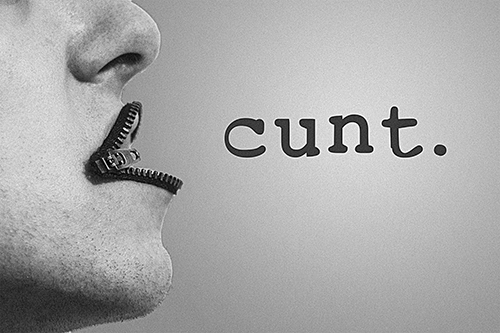
No shock here: We’ve become relatively shock-proof. With the parade of trashy reality TV shows, exorbitantly violent video games and cringe-inducing political coverage, we seem to be immune to almost everything shocking. But last fall I started noticing the comeback of a word that generally makes most people do a double-take: cunt. This reemergence wasn’t occurring in colloquial conversation with my friends; I was hearing it more and more frequently on television.
Last August, Gwyneth Paltrow used it in reference to her grandmother during an interview on Chelsea Lately. In February, a male character in the HBO show Girls used it in the presence of a few female characters, and no one even remarked on it.
On Oscars night, The Onion received a lot of backlash for a tweet that referred to 9-year-old nominee Quvenzhane Wallis as a c-word. In March, Amazon.uk defended a retailer who printed it on a Christmas card.
Just a couple weeks ago a Colorado gun-recall group spokesperson used it to refer to two lawmakers. The list goes on.
The recent rise in using “cunt” in the media is both frustrating and angering, because it delays progress feminists have made toward equality. It’s a violent term not useful for any other purpose than violence toward women. We need to be shocked by it, because allowing it to seep into colloquial conversation devalues the harm it does.
Although there have been some adverse responses to the word’s usage, it worries me that it’s now being freely thrown around, even if it’s meant as a joke. Of course the use of “cunt” is intended to shock, but it’s also seemingly become an acceptable stand-in for “bitch.”
While “bitch” is more or less socially acceptable, its purpose is to degrade, defile and insult women. The c-word signifies that as well, but its meaning runs deeper; it’s taboo because it is the deepest form of insult. Why, then, do we just throw
it around?
Many self-described feminists have attempted to “take back” the word cunt, and transform it from a pejorative term to a means of empowerment. Many minority groups throughout history have reclaimed derogatory terms that were intended to divide as a way to unite a community.
If those people who are denigrated, persecuted or maligned by the term are using it, then the word supposedly loses its violent meaning. The c-word is different, however. It can’t become a unifying term for women because it’s used violently by women against women.
It’s an insult—not used to signify camaraderie. As a feminist, I believe there are many ways to show that you’re in favor of women’s equality. Using a violent term, and therefore allowing that word to become acceptable, is counterproductive.
No one should be using it as a descriptor, but I especially take offense at it being used between women. There’s a momentous amount of work that’s been achieved by feminists in the past century, and that work is undermined each time a woman uses a violent word against another woman, especially a term that literally has no other meaning but to be offensive.
This trend of suddenly being less shocked by such a horrific word should be eradicated. Why Amazon.uk defends its use is beyond me. Why is it acceptable for Gwyneth Paltrow and Lena Dunham to use the word? How can Jane Fonda use the term casually during an interview on The View and be applauded?
It’s incredibly frustrating.
Women’s equality is a cause that requires unwavering support from everyone—regardless of gender—to be successful. Popularizing a term that’s only meant to offend and degrade can have no other purpose than to be hurtful toward all women and delay any progress toward equality.
So stop using it.

